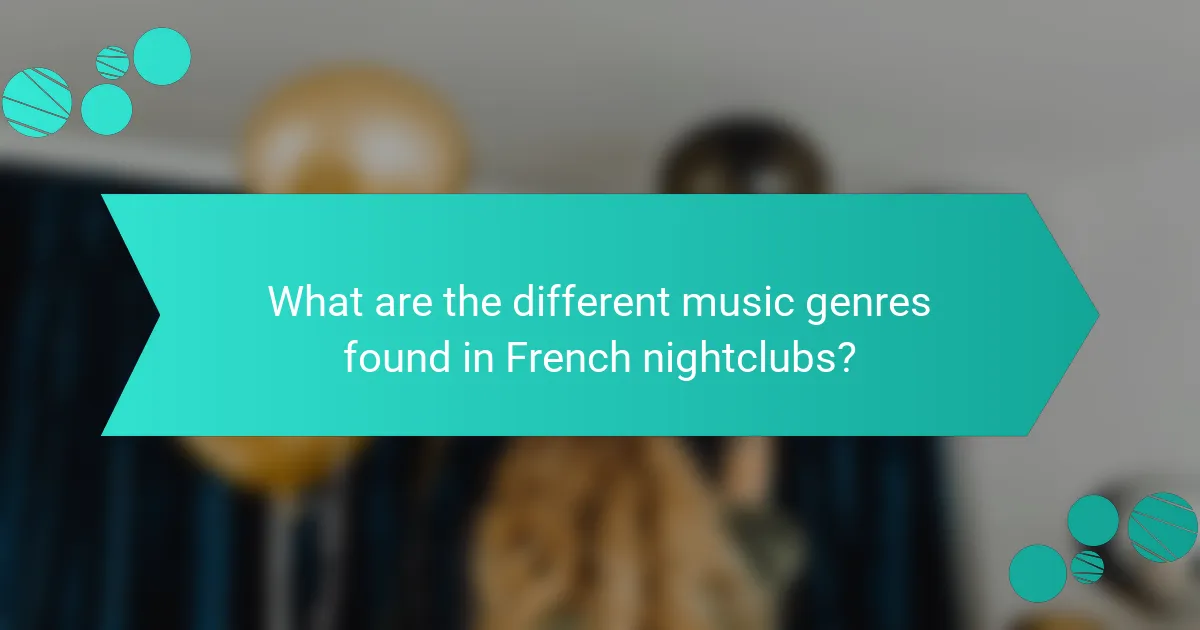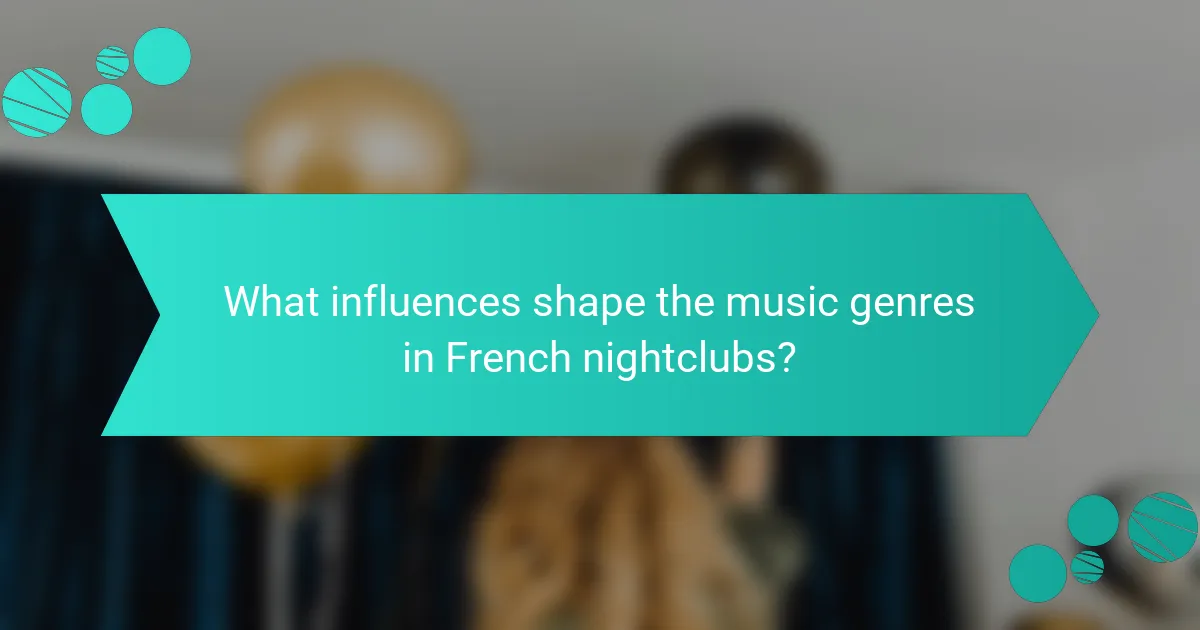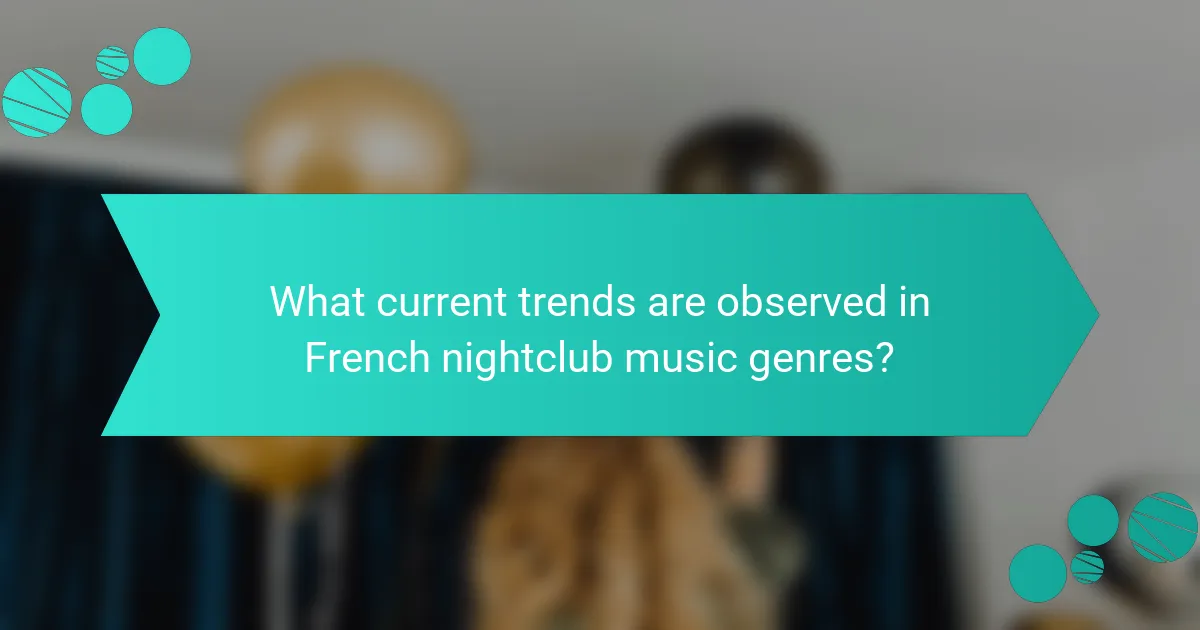French nightclubs showcase a rich diversity of music genres, prominently featuring house, techno, and hip-hop, alongside a resurgence of disco and funk. This vibrant nightlife scene is shaped by cultural, historical, and social influences, including the impact of American music styles. Current trends highlight a blend of genres, with house music characterized by deep basslines, techno focusing on minimalism, and hip-hop increasingly merging with electronic sounds. The rise of local artists and collaborations between genres further enrich the soundscape, reflecting the evolving tastes of club-goers in France.

What are the different music genres found in French nightclubs?
French nightclubs feature a variety of music genres. Common genres include house, techno, and electro. Hip-hop is also popular, appealing to a younger crowd. Disco and funk have made a resurgence in recent years. Additionally, pop music is frequently played to attract a broader audience. Reggae and dancehall can be found in some venues, catering to diverse tastes. The blend of these genres creates a vibrant nightlife scene in France. Each genre contributes to the unique atmosphere of French nightclubs.
How do house and techno music influence the nightclub scene in France?
House and techno music significantly shape the nightclub scene in France. These genres foster a vibrant atmosphere that attracts diverse crowds. The pulsating beats create an immersive experience for partygoers. Nightclubs often feature renowned DJs who specialize in these styles. Events like the Paris Electronic Week highlight their popularity. Additionally, house and techno music encourage extended dance sessions, often lasting until dawn. This culture promotes social interaction and community among attendees. France’s rich history in electronic music further cements its influence in the nightlife landscape.
What are the defining characteristics of house music in French clubs?
House music in French clubs is characterized by its repetitive beats, soulful vocals, and deep basslines. The genre often features a tempo ranging from 120 to 130 BPM. It incorporates elements from disco, funk, and electronic music. In French clubs, house music creates an immersive atmosphere for dancing. DJs often mix tracks seamlessly to maintain energy on the dance floor. The use of synthesizers and drum machines is prevalent in production. French house music also emphasizes a strong connection to the cultural scene, influencing fashion and art. Notable French artists, like Daft Punk and Laurent Garnier, have shaped the global perception of house music.
How has techno evolved in the context of French nightlife?
Techno has evolved significantly within French nightlife since its inception in the 1980s. Initially influenced by Detroit techno, it gained traction in underground clubs. The emergence of iconic venues like Rex Club in Paris helped establish a dedicated following. In the 1990s, techno diversified with sub-genres, including minimal and hard techno. French artists like Laurent Garnier and Daft Punk played pivotal roles in popularizing the genre. The 2000s saw a resurgence of interest, with festivals like Techno Parade celebrating the culture. Today, techno remains integral to France’s nightlife, blending with other genres and attracting diverse audiences. The genre’s evolution reflects broader trends in electronic music and club culture.
What role does hip-hop play in the diversity of music genres in French nightclubs?
Hip-hop significantly contributes to the diversity of music genres in French nightclubs. It introduces unique rhythms and lyrical styles that attract diverse audiences. This genre blends with other styles like house, electro, and R&B. French nightclubs often feature hip-hop alongside these genres, creating a rich musical tapestry. The popularity of hip-hop in France has grown exponentially since the 1990s. Artists like IAM and NTM paved the way for future musicians. This genre’s influence is evident in club playlists and DJ sets. Hip-hop’s integration fosters cultural exchange and innovation within the nightlife scene.
What are the key elements of hip-hop culture in French nightlife?
Key elements of hip-hop culture in French nightlife include music, dance, fashion, and graffiti. Music is primarily represented by rap and DJing, which dominate club scenes. Dance styles such as breakdancing are integral to hip-hop events. Fashion reflects urban streetwear trends, often showcasing brands that resonate with youth culture. Graffiti art is displayed in venues, adding a visual element to the culture. Additionally, community and social gatherings foster connections among fans. Events often feature local artists, enhancing cultural authenticity. These elements collectively define the vibrant hip-hop scene in French nightlife.
How do French hip-hop artists influence the genre’s popularity in clubs?
French hip-hop artists significantly influence the genre’s popularity in clubs through their unique sound and cultural relevance. Their music often integrates local dialects and contemporary themes, resonating with diverse audiences. This connection fosters a strong sense of identity among listeners. Additionally, collaborations with mainstream artists and producers enhance their visibility. Events like concerts and club nights featuring French hip-hop attract large crowds. Statistics show that hip-hop represents a substantial portion of music played in clubs. For example, a 2021 report indicated that hip-hop tracks accounted for over 30% of club playlists in Paris. This trend reflects the genre’s growing acceptance and appeal in nightlife settings.
What other genres are prominent in the French nightclub scene?
The French nightclub scene prominently features genres such as techno, house, and hip-hop. Techno has deep roots in cities like Paris and Lyon, influencing the electronic music landscape. House music, characterized by its rhythmic beats, is also widely popular in various venues. Hip-hop has gained significant traction, particularly among younger crowds. Additionally, genres like electro and trance contribute to the vibrant nightlife. The diversity of music genres reflects France’s rich cultural tapestry and evolving musical trends.
How does electronic music blend with traditional French music styles?
Electronic music blends with traditional French music styles through the incorporation of regional instruments and melodies. This fusion often features accordion, violin, and guitar, common in French folk music. Producers remix traditional songs, adding electronic beats and synthesizers. The result creates a modern sound while honoring cultural roots. Artists like Daft Punk and Air exemplify this blend. Their music integrates elements of chanson and musette, showcasing the versatility of both genres. This blending enhances the appeal of electronic music in French nightlife. It attracts diverse audiences seeking both innovation and nostalgia.
What are the emerging genres gaining traction in French nightclubs?
Emerging genres gaining traction in French nightclubs include Afro-house, trap, and techno. Afro-house blends African rhythms with house music and has seen increased popularity since 2020. Trap music, characterized by its use of hi-hats and heavy bass, has attracted younger audiences. Techno continues to evolve, with sub-genres like melodic and hard techno gaining followers. These genres reflect cultural influences and the evolving tastes of club-goers. The rise of these styles is evident in festival line-ups and club bookings across France.

What influences shape the music genres in French nightclubs?
The music genres in French nightclubs are shaped by cultural, historical, and social influences. French music history includes diverse genres like house, techno, and hip-hop. The global influence of American music styles has also played a significant role. Local artists incorporate these styles while adding unique French elements. Festivals and events promote genre blending and experimentation. The rise of digital platforms has increased access to various music styles. Social dynamics within clubs influence the popularity of certain genres. Overall, these factors create a vibrant and evolving music scene in French nightclubs.
How do cultural factors impact music choices in French nightlife?
Cultural factors significantly influence music choices in French nightlife. These factors include historical context, regional diversity, and social trends. France has a rich musical heritage that shapes contemporary preferences. For example, Parisian nightlife often features electronic music due to its historical ties to the techno movement. Regional influences also play a role; cities like Marseille may lean towards hip-hop, reflecting local demographics and cultural identity. Social trends, such as the rise of global music genres, further diversify club playlists. Events like the Fête de la Musique showcase this blend, highlighting how culture drives music selection in nightlife.
What historical events have influenced music trends in French clubs?
The emergence of electronic music in the late 1980s significantly influenced music trends in French clubs. The Parisian club scene was shaped by the rise of techno and house music during this period. The 1990s saw the popularization of French house, marked by artists like Daft Punk and Cassius. The rave culture, spurred by the 1998 World Cup, also played a role in evolving club music. Additionally, the influence of hip-hop grew in the 2000s, with artists like MC Solaar gaining prominence. The cultural exchange from immigration contributed to diverse musical styles in clubs. Key events, such as the 2002 release of “The Funky French League,” showcased this blend of genres. The historical context of these events is essential to understanding the evolution of music in French nightclubs.
How does the diversity of the French population affect nightclub music genres?
The diversity of the French population significantly influences nightclub music genres. France’s multicultural society brings various musical traditions and styles. This diversity leads to a blend of genres in nightclubs, including house, hip-hop, and electronic music. For instance, North African and Sub-Saharan influences contribute to the popularity of raï and afrobeats in Parisian clubs. Additionally, the presence of immigrant communities fosters an environment where different musical expressions thrive. Events often feature DJs who mix various cultural sounds, attracting a wide audience. Research indicates that 30% of club-goers prefer music that reflects this multicultural influence. Overall, the diversity of the French population enriches the nightclub music scene, creating a vibrant and eclectic atmosphere.
What role do DJs and producers play in shaping music genres in nightclubs?
DJs and producers play a crucial role in shaping music genres in nightclubs. They curate and mix tracks to create unique soundscapes. This process influences the atmosphere and energy of the venue. DJs select music that resonates with the crowd, often blending genres to keep the audience engaged. Producers contribute by creating original tracks that define or evolve specific genres. Their innovations can lead to the emergence of new styles. For example, the rise of house music in the 1980s was significantly shaped by influential DJs and producers in Chicago. In French nightclubs, this trend continues as local artists blend house, techno, and hip-hop, reflecting cultural influences. The collaboration between DJs and producers fosters a dynamic music scene that continuously evolves.
What are the most popular DJ styles and techniques in French nightclubs?
The most popular DJ styles in French nightclubs include house, techno, and hip-hop. House music is characterized by its repetitive beats and melodic elements. Techno is known for its synthetic sounds and driving rhythms. Hip-hop incorporates sampling and turntablism techniques. DJs often use beatmatching to create seamless transitions between tracks. Looping is another common technique, allowing DJs to extend certain sections of a song. Live remixing is also popular, where DJs alter tracks in real-time. These styles and techniques reflect the vibrant nightlife culture in France. The diversity of music genres enhances the overall club experience for attendees.
How do collaborations between DJs and artists influence genre diversity?
Collaborations between DJs and artists significantly enhance genre diversity. These partnerships merge different musical styles, creating innovative sounds. For instance, a DJ collaborating with a hip-hop artist can infuse electronic beats with rap elements. This fusion generates a unique genre that attracts diverse audiences.
Furthermore, such collaborations often lead to cross-genre experimentation. Artists are encouraged to explore new sounds outside their usual style. This process broadens the musical landscape, as seen in the rise of genres like trap and electronic dance music.
Statistically, collaborations have led to increased chart diversity. Billboard reports that genre-blending tracks frequently dominate the charts. This trend illustrates how collaborations are reshaping the music industry. Overall, collaborations between DJs and artists play a crucial role in fostering genre diversity.

What current trends are observed in French nightclub music genres?
Current trends in French nightclub music genres include a blend of house, techno, and hip-hop. House music remains popular, characterized by its deep basslines and rhythmic beats. Techno has seen a resurgence, with a focus on minimalism and immersive experiences. Hip-hop influences are increasingly prominent, often merging with electronic sounds. Additionally, there is a growing interest in local artists and regional styles. Collaborations between genres are common, creating unique soundscapes. The use of live instruments in electronic sets is also on the rise. These trends reflect the evolving tastes of club-goers in France.
How do technological advancements impact the music played in nightclubs?
Technological advancements significantly influence the music played in nightclubs. They enhance sound quality through advanced audio equipment. Digital audio workstations allow DJs to mix tracks seamlessly. Software tools enable real-time remixing and layering of sounds. Lighting technology synchronizes with music, creating immersive experiences. Streaming services provide access to diverse music genres instantly. Social media platforms help promote emerging artists and trends. These advancements shape the overall nightclub experience and influence musical selections.
What role does social media play in promoting music genres in clubs?
Social media plays a crucial role in promoting music genres in clubs. It serves as a platform for artists and DJs to share their work. Social media allows for real-time engagement with audiences. Clubs can use social media to announce events and showcase line-ups. This increases visibility and helps attract larger crowds. Viral trends on platforms like Instagram and TikTok can elevate specific music genres. According to a study by the International Journal of Music Business Research, 70% of music discovery happens through social media. This highlights its impact on genre popularity in nightlife settings.
How are streaming platforms influencing the music selection at nightclubs?
Streaming platforms are significantly influencing music selection at nightclubs. They provide DJs and club owners with access to a vast library of tracks. This accessibility allows for a diverse range of genres to be played. Data from platforms can reveal trending songs and artists. DJs often use this information to curate playlists that resonate with audiences. Popularity metrics from streaming services guide music choices. This trend helps in adapting to audience preferences in real-time. Consequently, nightclubs can create a more engaging atmosphere. The integration of streaming technology enhances the overall nightlife experience.
What are the future predictions for music genres in French nightclubs?
Future predictions for music genres in French nightclubs indicate a rise in electronic and hybrid genres. House music will continue to dominate due to its established presence. Increased interest in Afrobeat and Latin influences is expected to shape club playlists. Hip-hop will maintain its popularity, especially with French artists gaining international recognition. Genres like trap and reggaeton are likely to grow in prominence. The integration of live performances with DJ sets may become more common. Data from recent surveys show that club-goers are seeking diverse musical experiences. This trend suggests a shift toward more eclectic lineups in the future.
How might changing demographics influence future music trends in clubs?
Changing demographics will significantly influence future music trends in clubs. As populations become more diverse, the demand for varied music genres will increase. Younger generations often seek music that reflects their multicultural backgrounds. This shift may lead to the rise of genres like Afrobeat, Reggaeton, and K-Pop in club playlists.
Moreover, the integration of technology will play a crucial role. Streaming services provide access to global music trends. This access allows DJs to experiment with different styles and genres. Research shows that clubs catering to diverse audiences tend to thrive. A study by the International Music Summit highlights that clubs featuring eclectic music attract larger crowds.
In summary, changing demographics will drive clubs to embrace a broader range of music genres to meet evolving audience preferences.
What are some potential emerging genres to watch in the coming years?
Potential emerging genres to watch in the coming years include Afro-house and lo-fi hip-hop. Afro-house blends African rhythms with house music, gaining popularity in nightlife scenes. Lo-fi hip-hop offers a chill, laid-back vibe, appealing to younger audiences. Additionally, electronic pop is evolving with influences from various cultures. These genres reflect the global fusion trend in music. The rise of streaming platforms amplifies exposure to diverse sounds. Events like festivals are increasingly showcasing these genres. This trend indicates a shift in listener preferences towards more eclectic styles.
What tips can enhance the nightclub experience related to music genres?
To enhance the nightclub experience related to music genres, consider exploring diverse playlists. Different genres can create distinct atmospheres. For example, house music often promotes dancing, while hip-hop encourages social interaction. Engaging with the DJ can also enhance the experience. Requesting specific tracks or genres can personalize the night. Additionally, attending themed nights focused on particular genres can deepen appreciation. Understanding the history of the music can enrich the overall experience. Knowledge about artists and their influences can lead to more meaningful connections with the music.
The main entity of the article is the diversity of music genres in French nightclubs. The article explores various genres such as house, techno, hip-hop, disco, and electro, detailing their influence on the vibrant nightlife scene in France. It examines the characteristics of house and techno music, the role of hip-hop in promoting cultural diversity, and how DJs and producers shape these genres. Additionally, it highlights current trends, technological impacts, and future predictions for music genres in French nightclubs, emphasizing the importance of cultural and demographic influences on music choices.